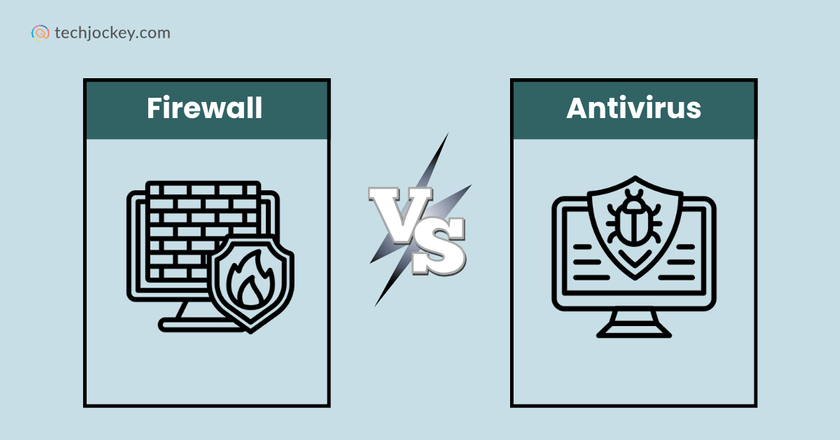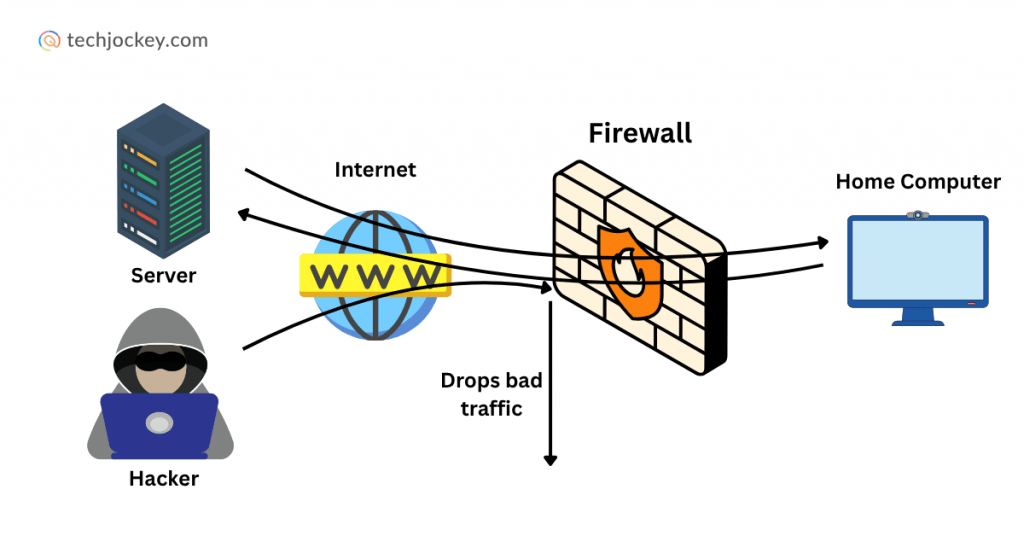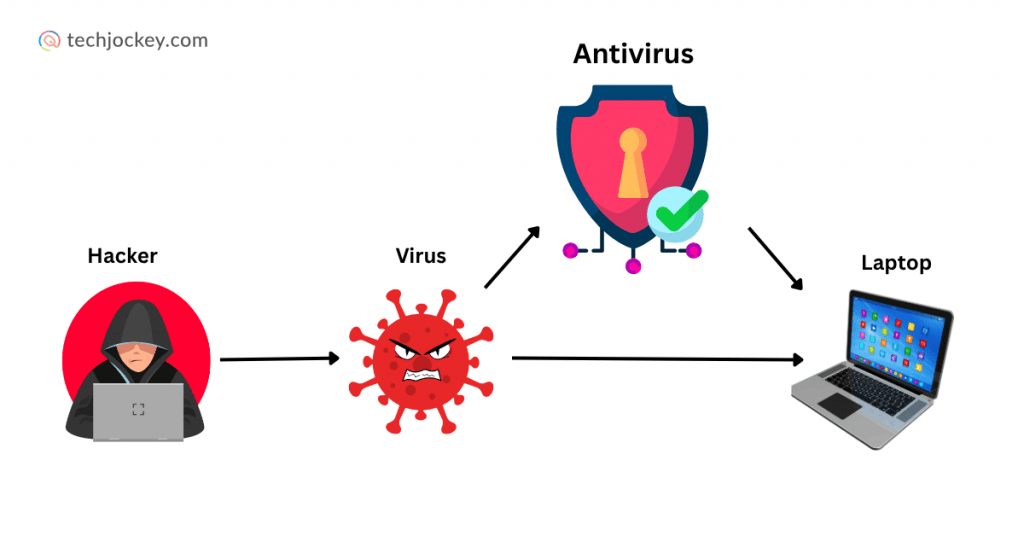What is the Difference Between Firewall and Antivirus: Detailed Comparison Guide

By 2027, the yearly average cost of cybercrimes will cross $23 trillion. That’s huge! Day by day, cyber threats are becoming more dangerous. There’s no end to phishing emails, ransomware attacks, or any other crime.
But you can prevent anything with the right hack or a tool. A firewall and an antivirus are made to keep these digital dangers at bay.
We will be discussing in this blog the difference between a firewall and an antivirus, and how both work in protecting your data.
What is a Firewall?

A firewall is a network security Solutions that keeps an eye on your incoming and outgoing traffic. It’s like a wall between your computer and the internet that controls what information should be shared between each other.
In simple terms, it has a set of security rules that block any irrelevant or malicious data so that it does not harm your computer. The above-mentioned image clearly shows its working representation.

Cisco Firewall 1010E
Starting Price
Price on Request
Types of Firewalls
- Hardware firewalls: As the name suggests, these are physical devices connected between the external network and your PC. Mostly, it is used by businesses to filter traffic before it does anything wrong to their computers.
- Software firewalls: These are firewall security management software that can be installed on your devices. These are perfect for small businesses or home users. You can get them customized as per your preferences.

Check Point Next Generation Firewalls (NGFWs)
Starting Price
Price on Request
Benefits of a Firewall
- They block unauthorized access.
- They keep your network protected from hackers who can exploit vulnerabilities.
- They prevent malware that tries to send data out of your system.
What is Antivirus Software?

If somehow, a virus has entered your system due to the absence of a firewall or any other way, an antivirus software can be helpful.
While a firewall is a boundary that would not let any virus come inside, on the other hand, an antivirus software works against viruses or threats inside your system.
It detects and blocks malware such as viruses, trojans, worms, spyware, etc.
Here’s the working of an antivirus:
- Firstly, it scans all the files and apps in real-time present in your system.
- Then, it compares those files against known malware.
- In case it finds something suspicious, it immediately removes that particular file.

Kaspersky Antivirus
Starting Price
₹ 480.00 excl. GST
Modern antivirus tools:
- It looks for suspicious behavior to catch even unknown malware before it causes harm using heuristic analysis.
- Protects you instantly by blocking threats the moment they show up.
- Uses cloud-based scanning so you get faster updates and better protection.
Benefits of Antivirus Software
- It washes away any infections that have already made their way to your computer.
- It keeps your files and personal data protected and safe.
- It avoids you becoming a scam victim.

Quick Heal AntiVirus Pro
Starting Price
₹ 979.00 excl. GST
Key Difference Between Firewall and Antivirus
Working of a firewall and an antivirus might seem similar, but they complement each other and work on different levels. Here’s a tabular firewall and antivirus difference.
| Feature | Firewall | Antivirus |
|---|---|---|
| Main Purpose | Controlling and filtering network traffic | Scans, detects, and removes malware |
| Protection Level | Network-level protection | File and device-level protection |
| Focus | No entry for unauthorized access | Identification and elimination of infections |
| Type of Threats Handled | Hackers, suspicious traffic, port scanning | Viruses, trojans, worms, spyware, ransomware |
| How It Works | Uses security rules to allow/block traffic | Uses signature databases, heuristics, and AI to scan and remove threats |
| Examples | Windows Defender Firewall, Cisco ASA, Fortinet | Bitdefender, Norton, Kaspersky, McAfee |
Similarities Between Firewall and Antivirus
Although the functionalities of both are different, they share some similarities:
- Both of them save your computer from cyber threats and help in providing high-end security to your systems.
- Both monitor files on your device or network traffic to identify if there’s something suspicious or damaging.
- Both are dependent on updates to detect and prevent the newest threats, which means they require regular maintenance.
- They both can be packaged into one security solution or a suite, providing the user with dual protection without additional tools.
- They both act more or less in the background, and their high level of protection does not demand an in-depth technical background to use.
- If combined, they represent a layered security approach that will make it more difficult for the attacker to breach.
Why Firewall and Antivirus Work Better Together?
You may be asking yourself: since I already have a firewall, do I still need antivirus? Or rather, vice versa? The answer is yes. Here’s why:
- Firewalls will be your primary form of protection, preventing most threats to enter your system.
- Nonetheless, certain types of malware may still manage to access it, say through USB flash disks, emails, or through software downloads.
- The antivirus traps such threats once they get to your computer system, scans them, and destroys them.
That is, using a single tool is insufficient since it contains gaps in protection. Cybersecurity analysts would always advise you to use a stratified security system, which involves:
- Firewall for network-level protection
- Antivirus for endpoint-level protection
- Using good practices like strong passwords and doing regular updates
Practical Tips to Use Them Effectively
Just installing these tools on your PC is not enough; you must know how to use them. The following are some practical tips:
For firewalls
- Your firewall must always remain on-try not to disable it for better protection.
- If it’s possible, go for both hardware and software firewalls. This is mainly for small businesses.
- Customize the rules: block inactive ports, restrict certain apps, and monitor traffic logs regularly.
Antivirus
- Always keep your antivirus updated so it knows about the latest threats.
- Run full-system scans regularly and not quick scans.
- Keep real-time protection on.
- Do not download files or programs from sources you doubt.
For overall safety
- Use strong and unique passwords and don’t forget to change them regularly.
- Your operating system and applications should always remain up to date to patch vulnerabilities.
- It’s highly recommended to back up your important files regularly. Don’t let malware hold your data hostage.
Modern Trends: Next-Gen Tools
Firewalls and antivirus programs keep updating. Here is a glimpse at what’s new:
- Next-Generation Firewalls (NGFW): Do more than filtering. They provide intrusion prevention, application control, and even threat intelligence.
- Endpoint Detection and Response (EDR): Modern antivirus offers AI-based threat detection. Also, offers behaviour analysis and incident response.
- Unified Threat Management (UTM): It integrates a firewall and antivirus in one solution. It makes it easy for businesses to manage security in their systems.
Conclusion
Let’s recap:
A firewall does not let unauthorized users and network traffic move into your computer.
An antivirus can be useful to avoid malicious software from entering into your laptop by scanning it, finding it, and finally removing it.
Both of these give your system a good level of security in different ways; thus, you need both.
You just can’t hold on to anyone; you need to opt for a layered approach for more data privacy. It includes all – firewall, antivirus, regular updates, and smart practices.
Mehlika Bathla is a passionate content writer who turns complex tech ideas into simple words. For over 4 years in the tech industry, she has crafted helpful content like technical documentation, user guides, UX content, website content, social media copies, and SEO-driven blogs. She is highly skilled in... Read more








